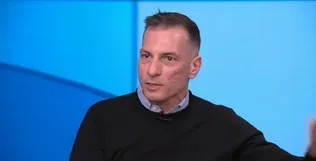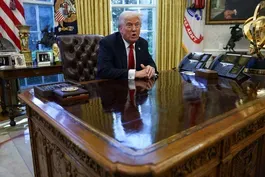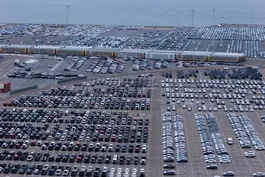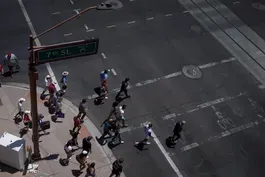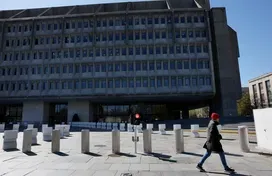
ACLU sues Trump for using wartime authority in deportations
Clip: 3/27/2025 | 8m 10sVideo has Closed Captions
ACLU attorney on suing Trump administration for using wartime authority for deportations
President Trump’s use of the Alien Enemies Act to deport hundreds of Venezuelan migrants, without due process, could end up at the Supreme Court. An appeals court upheld a ruling blocking the administration from using the rare wartime authority for deportations, a decision the White House will appeal. Laura Barrón-López discussed the case with Lee Gelernt of the ACLU's Immigrants Rights Project.
Problems with Closed Captions? Closed Captioning Feedback
Problems with Closed Captions? Closed Captioning Feedback
Major corporate funding for the PBS News Hour is provided by BDO, BNSF, Consumer Cellular, American Cruise Lines, and Raymond James. Funding for the PBS NewsHour Weekend is provided by...

ACLU sues Trump for using wartime authority in deportations
Clip: 3/27/2025 | 8m 10sVideo has Closed Captions
President Trump’s use of the Alien Enemies Act to deport hundreds of Venezuelan migrants, without due process, could end up at the Supreme Court. An appeals court upheld a ruling blocking the administration from using the rare wartime authority for deportations, a decision the White House will appeal. Laura Barrón-López discussed the case with Lee Gelernt of the ACLU's Immigrants Rights Project.
Problems with Closed Captions? Closed Captioning Feedback
How to Watch PBS News Hour
PBS News Hour is available to stream on pbs.org and the free PBS App, available on iPhone, Apple TV, Android TV, Android smartphones, Amazon Fire TV, Amazon Fire Tablet, Roku, Samsung Smart TV, and Vizio.
Providing Support for PBS.org
Learn Moreabout PBS online sponsorshipAMNA NAWAZ: The showdown between President Trump and the judiciary continues this week.
GEOFF BENNETT: That's after a U.S. appeals court upheld a federal judge's ruling blocking the administration from using a rare wartime authority for deportations.
Our White House correspondent, Laura Barron-Lopez, has more.
LAURA BARRON-LOPEZ: President Trump's use of the 1798 Alien Enemies Act to deport hundreds of Venezuelan migrants without due process could now end up in front of the Supreme Court.
The White House said it plans to appeal a circuit court decision that kept the temporary block on deportations in place.
This week, Homeland Security Secretary Kristi Noem visited the maximum security prison in El Salvador where migrants the Trump administration alleges are gang members are now being held.
There, she recorded a message in front of prison.
KRISTI NOEM, U.S.
HOMELAND SECURITY SECRETARY: I also want everybody to know, if you come to our country illegally, this is one of the consequences you could face.
First of all, do not come to our country illegally.
You will be removed and you will be prosecuted.
But know that this facility is one of the tools in our toolkit that we will use if you commit crimes against the American people.
LAURA BARRON-LOPEZ: For more on this case, I'm joined by Lee Gelernt of the American Civil Liberties Union and lead counsel in the case suing the federal government.
Lee, thank you so much for joining.
The Trump administration, as we said, is still blocked from deporting Venezuelan migrants using the Alien Enemies Act, who they allege are gang members or are tied to Tren de Aragua.
But that's a temporary block.
So what comes next?
LEE GELERNT, Attorney, American Civil Liberties Union: So the White House has said that they will seek to overturn that temporary block in the Supreme Court, so we expect to see something from the government any second now or tomorrow, at latest Monday.
We will obviously oppose that.
We think the block makes sense because this case needs -- has weighty issues and needs to play out in a proper way.
If the TRO is vacated by the Supreme Court, the government will seek to send hundreds more men to a Salvadoran prison, potentially for the rest of their lives, without any due process.
We don't think this wartime authority can be used during peacetime.
And certainly, if it can be used, there has to be some due process, because many of these men dispute that they're gang members.
And the more and more we're learning about the men, the more and more we have real doubts that they are in fact related to the gang.
LAURA BARRON-LOPEZ: Lee, what's the ACLU's main argument here?
Why do you say that the president's use of this centuries-old wartime power is potentially unlawful?
LEE GELERNT: The first, and I think most important maybe, is that this wartime authority can't be used.
Congress was very, very clear in this statute, as you said, enacted in 1798, that there must be a foreign government or nation in a declared war with the United States or a foreign government or nation must be invading the United States or there must be predatory incursions, threatened or attempted.
Nothing like that is happening.
As judge Henderson and the D.C.
Circuit pointed out, migration is not an invasion.
This is a very dangerous path we're going on if the government can say we're unilaterally going to designate any gang we want during peacetime as an enemy alien and then ship people off, especially if there's no due process.
I would just add that Congress was so specific that no other administration in the history of this country has been confused about what powers it vests the president with.
It's only been used three times in the history of the country, all during declared wars, the War of 1812, World War I and World War II.
No president has tried to take this lawless action of saying we're going to designate a criminal gang as a foreign country invading the United States.
LAURA BARRON-LOPEZ: During the last hearing before the district court, Judge James Boasberg said that he will get to the bottom of whether his order to pause deportations was violated by the administration.
Where does that stand?
LEE GELERNT: Yes, so that's a parallel proceeding.
On the Saturday night in which we filed, the judge said, I want the planes turned around if they're in the air and the people haven't been turned over the Salvadoran government yet.
He was very clear about that.
Nonetheless, the government turned those individuals over to the Salvadoran government, despite his order.
The government's claiming they didn't violate the order.
He has made clear that he wants to get to the bottom of whether a federal court order was violated.
Those proceedings are ongoing.
The government has said, we won't answer the judge's questions.
They have invoked what's called the state secrets privilege, saying these are such secrets that we can't let anybody see them.
We have a brief do on that on Monday, and I suspect the judge will move fairly quickly to determine whether his orders have been violated.
LAURA BARRON-LOPEZ: The administration says that they are being stopped from deporting criminals and now terrorists after classifying Tren de Aragua as such.
Are there other immigration laws that the administration could use to deport criminals?
LEE GELERNT: Yes, I'm glad you asked about that, Laura.
The judge was extremely clear, took pains to emphasize he is not saying these individuals cannot be criminally prosecuted if they have committed a crime, nor is he saying that they can't be removed from the country under the immigration laws.
Congress has set up a process to remove people who don't have a right to remain in this country.
All he is saying is that this wartime authority -- the courts are saying this wartime authority cannot be used during peacetime.
Use your other authorities, and they can continue to detain these individuals.
So the government's suggestion that these individuals are just going to be roaming around the streets if they don't have the authority to use the Alien Enemies Act is absolutely wrong.
So this is more a situation of, can you now allow the president to unilaterally declare a war against anybody and then send them to a foreign prison, and perhaps for the rest of their lives, based on unilateral allegations that they're gang members without any process?
LAURA BARRON-LOPEZ: I want to ask you about some of those Venezuelans that were deported to El Salvador mega-prison, CECOT.
"Mother Jones" talked to the sister of one man, Neri Alvarado, and she said that her brother has no ties to Tren de Aragua.
One of his tattoos is an autism awareness ribbon tattoo in honor of his little brother.
And "Mother Jones" reports that ICE told Alvarado that they were finding and questioning everyone with tattoos, but that Alvarado was deemed -- quote -- "clean by ICE."
And then, in another report from The Miami Herald, they found that one man, Frengel Reyes Mota, was in the middle of a political asylum case.
He has no tattoos.
His detention records are riddled with errors and reportedly has no criminal record in Venezuela.
Lee, how many cases are there like these?
And if some of these Venezuelans deported to El Salvador are found to have no ties to Tren de Aragua, can they return home and be reunited with their families?
LEE GELERNT: Yes, you're asking the exact right question, and I wish I knew This was all done in secret to begin with.
The president signed the proclamation apparently on March 14, although now he says he didn't sign anything.
But they didn't publish it until the 15th.
In the meantime, they tried to move everyone out in secret.
We don't know too much about all the individuals.
But what we are learning about many of the individuals is that they appeared to have had no relation to the gang.
And I think we're going to see more and more information come out that the people who were removed didn't have a connection to the gang.
And one of the things we're hearing is that the government based it on tattoos.
But what experts say is, there's no definitive way based on tattoos to know whether someone is a gang member.
And so I think what the judge is going to do is take this one step at a time and see whether his order was violated, whether the government deliberately violated his order to turn around the planes.
And if they were, we're going to ask him to order the government to bring these people back.
The government is saying, well, they're now in another country's prison, but the truth is that we pay for these detentions.
They're -- El Salvador is doing it at our behest.
And so there's no question the United States could get them back out if they wanted to.
LAURA BARRON-LOPEZ: Lee Gelernt of ACLU, thank you for your time.
LEE GELERNT: Thanks for having me.
Angelo Carusone on tracking Project 2025, right-wing media
Video has Closed Captions
Angelo Carusone on tracking Project 2025 and right-wing media (8m 24s)
Ex-FTC commissioner says firing threatens agency
Video has Closed Captions
FTC commissioner fired by Trump says move threatens agency designed to protect consumers (6m 36s)
How automakers are navigating Trump’s tariffs
Video has Closed Captions
How automakers are navigating Trump’s tariffs on imported vehicles and parts (6m 50s)
New development tests car-free living in sprawling cities
Video has Closed Captions
Development near Phoenix tests whether car-free living is sustainable in sprawling cities (7m 39s)
News Wrap: HHS cutting workforce by nearly 25 percent
Video has Closed Captions
News Wrap: Health and Human Services cutting workforce by nearly 25 percent (6m 39s)
Tariffs, cuts complicate life for some who voted for Trump
Video has Closed Captions
Trade wars, federal cuts complicate lives of some Nebraskans who put Trump back in office (6m 48s)
Providing Support for PBS.org
Learn Moreabout PBS online sponsorshipMajor corporate funding for the PBS News Hour is provided by BDO, BNSF, Consumer Cellular, American Cruise Lines, and Raymond James. Funding for the PBS NewsHour Weekend is provided by...
